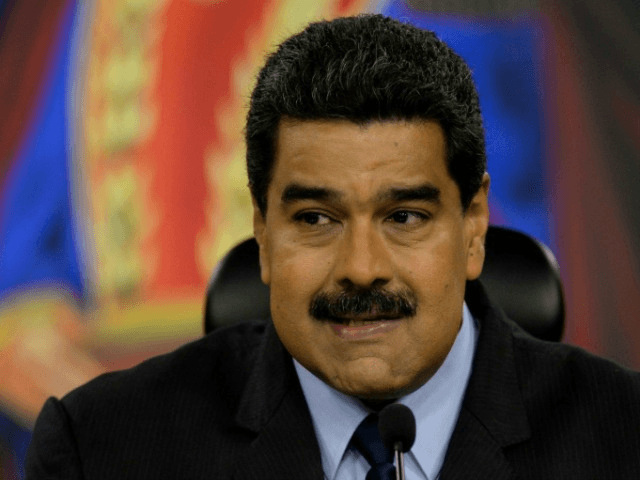The Trump administration issued a statement Thursday supporting the Venezuelan opposition’s rejection of a sudden presidential election called by dictator Nicolás Maduro, excoriating Maduro for not being “courageous enough” to hold a free and fair election.
Last month, Maduro called a presidential vote to be held no later than April, claiming the vote would be an act of defiance against U.S. President Donald Trump. A three-month window makes it impossible for political parties to hold primaries or even recruit candidates. The nation’s courts also disqualified the largest opposition coalition in the country, the Democratic Unity Roundtable (MUD), from fielding a candidate in the election.
“The United States denounces the decision by Venezuela’s National Electoral Council to unilaterally advance presidential elections without guarantees to ensure free, fair, and internationally-validated elections,” State Department spokesperson Heather Nauert said in a statement on Thursday. “These elections do not have the agreement of all political parties and limit the ability of individuals to run in the election.”
Nauert went on to say the government supports “the decision by opposition parties to reject the regime’s terms for elections that would not be free and fair.”
“It is unfortunate the Maduro regime is not courageous enough to contest elections on a level playing field,” her statement lamented.
Trump has prioritized opposing Maduro’s catastrophic reign over Venezuela in his foreign policy. During the National Prayer Breakfast this week, the president acknowledged that “millions of people in Iran, Cuba, Venezuela, North Korea, and other countries suffer under repressive and brutal regimes,” asserting that America “stands with all people suffering oppression and religious persecution.”
In remarks at the U.S. Embassy in Caracas on Thursday, America’s charge d’affaires in Venezuela, Todd Robinson, echoed this sentiment, as well. (The U.S. does not have an ambassador in the country.)
“You all deserve better,” Robinson asserted. “Democracy has been degraded using a mask that shows all the contrary, things should not be this way.” He also expressed support for U.S. sanctions on Venezuelan government drug criminals and corrupt officials.
Secretary of State Rex Tillerson showed some interest in further sanctions on Venezuela during his trip to Latin America this week, suggesting that Washington may sanction Venezuela’s oil trade. Venezuela is an OPEC member nation and reportedly possesses the world’s largest known oil reserves; sanctioning its oil industry would deal a devastating blow to the government. Maduro’s officials insist such a move would also devastate the national economy, but socialist policies have driven inflation close to 13,000 percent and its minimum wage to less than $1 a month.
Speaking alongside Colombian President Juan Manuel Santos in Bogotá this week, Tillerson also condemned Maduro’s presidential elections.
“Our only objective is to see Venezuela return to its constitution, return its duly-elected assembly, and to hold free and fair elections and give the Venezuelan people the right for their voices to be heard in elections,” Tillerson said.
Santos also condemned the vote: “Maduro would never, never accept participating in free, clean elections because he knows he will lose. And under those conditions, it will be impossible for Colombia [to accept the vote].”
The elections have split an already-fractured Venezuelan opposition. The MUD – which consists of multiple minority parties and is led by members of the Socialist International – is once again participating in “talks” with Maduro, which reports indicated have not led to any progress. The Dominican Republic is serving as a guarantor for the talks, where neither side has agreed to any provisions. Despite this, the Argentine newspaper Clarín, citing sources within the MUD, reported this week that some MUD parties are leaning towards fielding candidates in the presidential race.
While Venezuela’s supreme court invalidated the MUD from the race, its reasoning was that the member parties of the MUD could participate as individual entities.
An official with Popular Will, a MUD Party, told Clarín that Maduro is so unpopular in Venezuela that any opposition candidate would be able to sweep to victory in a free and fair election. “We need a candidate, a leader, that enjoys approval from all and who spearheads the struggle for elections with transparency and international observers,” Luis Florido told the newspaper.
Popular Will’s leader, Leopoldo López, may be such a candidate, but he is disqualified from running for office because since 2014, he has been serving a decade-plus prison sentence on false “inciting violence” charges.
The opposition’s candidate in the last two presidential races, former Miranda Gov. Henrique Capriles Radonski, was also disqualified from running for any public office for 15 years for nebulous reasons.
Anti-socialist hard-liners in the opposition have called for Venezuelans to boycott the elections.
“Those sectors of the opposition that have decided to participate or are tempted to, they cannot be part of or complicit with a process that seeks to legitimize this regime, not just for six years [the presidential term in Venezuela], but indefinitely,” María Corina Machado of the Vente Venezuela Party said this week. Machado has called the vote a “narco-fraud,” referring to the high number of Venezuelan government officials tied to cocaine trafficking in the hemisphere.
Maduro is currently the only candidate in the presidential race and has already broken at least two electoral laws with impunity.
Elections in Venezuela are scheduled for April 22. All candidates must be on the ballot by the end of February.

COMMENTS
Please let us know if you're having issues with commenting.